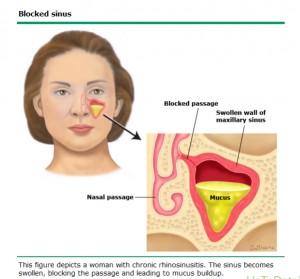Signs and Symptoms of Sinusitis
Sinusitis is a condition in which the lining of the sinuses become inflamed and swollen, and begin producing excess mucus. Sinusitis can be caused by a range of factors including infection, allergies, and air pollution, but it is most commonly caused by a viral infection.
It is not always necessary to see GP or specialist when suffering from sinusitis. Mild cases can usually be treated with rest, drinking plenty of fluids, or cleaning the nose with salt water.

Sinusitis Symptoms
- pain, swelling and tenderness around your cheeks, eyes or forehead
- blocked nose
- reduced sense of smell
- green or yellow mucus from your nose
- bad breath
- tiredness
If symptoms persist for over four weeks, it is considered acute sinusitis, and if symptoms persist over 12 weeks it is considered to be chronic sinusitis.
Sinusitis Treatment
If you are experiencing prolonged sinusitis symptoms (4 weeks or more), or recurrent episodes of sinusitis (more than 4 in a year), it is advisable to speak to your GP about further treatment options. These may include corticosteroids (nasal topic spray or systemic), antihistamines, and/or antibiotics. If these do not help to alleviate symptoms, then it may be worth asking your GP to refer you to a specialist to consider further treatment alternatives, including surgery.
- Nasal and oral steroid therapy – Corticosteroid spray may be suggested if you also suffer from hayfever, and can be prescribed for up to three months. This works by helping to reduce the swelling in your sinuses. Read information about Corticosteroids Side Effects
- Antimicrobial therapies – Your GP may prescribe antibiotics if a bacterial infection is causing your symptoms and you’re very unwell or at risk of complications.
- Desensitisation – Those with an allergy to aspirin, nasal polyps and asthma have the option of aspirin desensitisation, which can reduce asthma severity, the rate of polyp regrowth and the severity of sinusitis.
Surgery
Surgical treatment can be considered an adjuvant to medical therapy for control of chronic sinusitis. Surgery is generally required in cases where it is necessary to reopen the nasal and sinus passages, remove trapped mucus or polyps and improve the delivery of topic nasal medications.
Though surgery is effective in treating chronic sinusitis, additional treatments may be required to manage the condition long-term. This is because the underlying cause of nasal lining inflammation will require ongoing medical therapy to ensure that symptoms do not return. In practice, this may require the regular long-term use of medication.
Concerns or questions?
Contact one of our ENT Specialists:
- Phone: 1300- 952-808
- Email: admin@melbentgroup.com.au